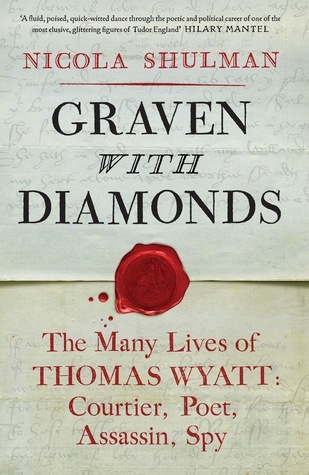What do you think?
Rate this book


320 pages, Kindle Edition
First published February 5, 2013
What if 'mine heart' is also an actual object, a heart-shaped envelope made of cloth with a balloon, or squeaking thing inside? Now the poem comes to life ... Was it part of a dance or a word game, or did everyone run around trying to find it? ... We will now have a very different response to a song beginning sadly... when we picture Wyatt declaiming it to a circle of laughing partygoers, while holding up a bladdered heart and giving it comical squeezes. Alas, I find thee faint and weak! (squeak!). Then... he would pop it at the end.
Time that is intolerant
Of the brave and the innocent,
And indifferent in a week
To a beautiful physique,
Worships language and forgives
Everyone by whom it lives;
Pardons cowardice, conceit,
Lays its honours at their feet.
Time that with this strange excuse
Pardoned Kipling and his views,
And will pardon Paul Claudel,
Pardons him for writing well.
The pair of them are the lyric poets who bookended the period of England's political greatness; both are poets of unreciprocated feeling, of frenetic inertia, and of fear. But I think the main reason why these particular lines kept coming back to me was that Wyatt's posthumous career refutes them on every count.
They flee from me that sometime did me seek
With naked foot, stalking in my chamber.
I have seen them gentle, tame, and meek,
That now are wild and do not remember
That sometime they put themself in danger
To take bread at my hand; and now they range,
Busily seeking with a continual change.
Thanked be fortune it hath been otherwise
Twenty times better; but once in special,
In thin array after a pleasant guise,
When her loose gown from her shoulders did fall,
And she me caught in her arms long and small;
Therewithall sweetly did me kiss
And softly said, "Dear heart, how like you this?"
It was no dream: I lay broad waking.
But all is turned thorough my gentleness
Into a strange fashion of forsaking;
And I have leave to go of her goodness,
And she also, to use newfangleness.
But since that I so kindly am served
I would fain know what she hath deserved.
Whoso list to hunt, I know where is an hind,
But as for me, alas, I may no more;
The vain travail hath wearied me so sore,
I am of them that furthest come behind.
Yet may I by no means my wearied mind
Draw from the deer, but as she fleeth afore
Fainting I follow; I leave off therefore,
Since in a net I seek to hold the wind.
Who list her hunt, I put him out of doubt,
As well as I, may spend his time in vain.
And graven with diamonds in letters plain,
There is written her fair neck round about,
"Noli me tangere, for Caesar's I am,
And wild for to hold though I seem tame."
started life on a single folded piece of paper tucked purposefully into Wyatt's doublet, so it could be passed slyly to a friend as he was waiting in a crowded presence chamber, or left somewhere where a girl would find it. It might make its public debut on the programme of pastime amusements for the inner court. But it could also be borrowed, circulated and copied, quoted in part or whole, a line or two murmured into someone's ear while dancing or gambling.
a more mysterious activity: a series of diversions and amusements played on the theme of courtly love, in which the players were not professionals but the members of the innermost court, and which ... might be described as the indoor, or feminised, division of chivalric games. Any attempts to describe it must proceed gropingly. The players were few and the rules were not written down. All that is left now is the poems, themselves counters in this game, many of them written by Thomas Wyatt.
Every morning 'at breakfast, one chine of beef, one cheat loaf and one manchet, and a gallon of ale; after noon, a manchet and a gallon of ale; at dinner, a piece of beef, a stroke of roaste and a rewarde, a cast of cheat bread, and a gallon of ale; at supper, a mess of porrage, a piece of mutton and a reward, a cast of cheat bread and a gallon of ale and a half gallon of wine at our cellar bar'. Every morning 'at our woodyard', four tall 'shyds' and two faggots; 'at our chandler's bar', in winter, every night, 'one pricket and four sizes of wax', with eight candles, white lights and one torch; 'at our pitcherhouse' weekly six white cups; and 'at every time of our removing one whole cart for the carriage of her stuff'.
the extirpation abolition and extinguishment of such abuses errours and enormities, as have long been violently maynteyned to the obtuscation of goddes holy and indeficiable [indivisible] truth.
[...]
Who list her hunt, I put him out of doubt,
As well as I may spend his time in vain.
And graven with diamonds in letters plain
There is written her fair neck round about:
Noli me tangere for Caesar's I am
And wild for to hold though I seem tame.